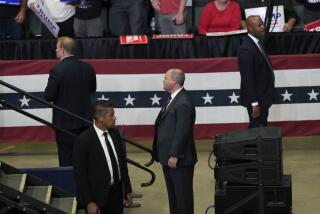Travel Flap Stirs In-House Probe; 5 to Regain Pay
WASHINGTON — The White House, in one more attempt to quell the furor over changes in its travel office staff, announced Tuesday it will investigate the role of its own officials in the affair and restore pay and benefits, at least temporarily, for five of the seven employees dismissed on mismanagement charges.
“Clearly, we did not handle this as we would have liked, and we’re going to do better,” said George Stephanopoulos, the White House communications director. The investigation will be overseen by White House Chief of Staff Thomas (Mack) McLarty and Office of Management and Budget Director Leon E. Panetta, he said.
Officials also attempted to end criticism that the White House had broken its own rules by contacting the FBI on the case without going through senior Justice Department officials. White House Counsel Bernard Nussbaum insisted officials had broken no “policy, procedure or other requirement” because the case dealt with “internal White House security.”
Nonetheless, citing the wishes of Atty. Gen. Janet Reno and White House officials to avoid “any possible appearance of impropriety,” Nussbaum said that from now on officials will contact one of the top three Justice Department officials before approaching the FBI.
Despite the White House statements, Republican leaders renewed their call for a full Justice Department investigation, and Sen. Joseph R. Biden Jr. (D-Del.), chairman of the Senate Judiciary Committee, called the affair an “amateur hour” involving “rookies.”
The flap at first seemed likely to be a minor one. When White House officials announced the dismissals May 19, citing bad record-keeping and possible criminal infractions, they said their goal was to improve service and save money for the press and White House staff, whose travel the employees arranged.
But criticism grew with disclosures that a distant cousin of Clinton’s, Catherine Cornelius, was named to head a reorganized travel office, and disclosures that the firings followed a complaint from the President’s friend, Harry Thomason, who has an interest in a firm that does work for airline charter companies. Thomason has denied that he would reap any financial benefit.
Stephanopoulos said the five employees have not, in effect, been rehired. Rather, he said, their administrative leaves were being indefinitely extended, with full pay and health benefits. That explanation differed in a key way from that given last week by White House Press Secretary Dee Dee Myers, who said all seven had been “dismissed.”
“The question is whether the people who were hurt did anything to merit it,” Stephanopoulos said. “We’ll just have to see.”
Stephanopoulos said the five now on leave are the junior members of the staff, who did not have “signatory authority” like their superiors, Billy R. Dale and Gary Wright. If they are cleared by the current FBI investigation, they could become eligible for federal jobs in some other part of the government, Stephanopoulos said. All seven have denied wrongdoing in the case.
Stephanopoulos acknowledged that White House officials had made “a mistake” in distributing last Friday as a press release a letter from the FBI that confirmed the agency was conducting a criminal investigation.
Nussbaum’s assertion that White House officials were free to contact the FBI directly on “internal security” questions did not seem borne out by a statement of Administration policy contained in a letter sent Monday by Philip B. Heymann, the deputy attorney general-designate.
In a letter to Biden, Heymann wrote that it was Reno’s view that “in the matter of any pending Department of Justice investigation or criminal or civil case, only the White House Counsel’s Office (with the exception of the President and vice president) should initiate contact with the Department of Justice . . . . These initial contacts should be only with the attorney general or the deputy attorney general or the associate attorney general.”
Later in the letter, Heymann stated: “The attorney general’s goal is to insulate the . . . attorneys and division chiefs from any effort, however well-intended, by persons outside the Department of Justice to influence their actions.”
On Monday, Reno called Nussbaum to register her concern about the contacts with the FBI. But a Justice Department spokesman, Carl Stern, insisted Reno had done so not out of any concern for Administration rules but because “she was very wary about the White House calling the FBI on anything--without going through her.”
Asked about Nussbaum’s defense, Stern said: “Technically, that’s correct. In theory this was not a pending investigation. It was something they were trying to bring to the attention of the FBI.”
Meanwhile, the FBI said it is conducting its own internal review of how it responded to the White House allegations of criminal activity at the travel office. The review, which is to be completed by the end of the week, is intended to help the agency answer questions from Reno and Congress.
Sen. Bob Dole (R-Kan.), the Senate minority leader, called on Biden to conduct hearings into the affair, citing a “potentially serious abuse of power” by the Clinton Administration. “It takes you back to Watergate.”
But Biden said he had no plans to hold such hearings because he was confident that Reno’s complaint to Nussbaum would avert any future problems.
Rather than “an attempt to inappropriately influence an investigation,” Biden said, “it seems what we have here are rookies on the beat.”
Clinton, meanwhile, continued to keep a careful distance from the affair, insisting he had little knowledge of what his subordinates had done.
“I had nothing to do with any decision, except to try to save the taxpayers and the press money,” he said during a Tuesday photo session at the White House.
More to Read
Sign up for Essential California
The most important California stories and recommendations in your inbox every morning.
You may occasionally receive promotional content from the Los Angeles Times.











